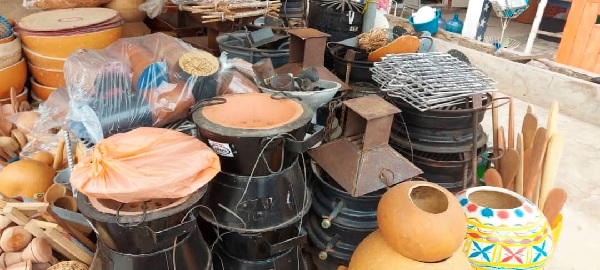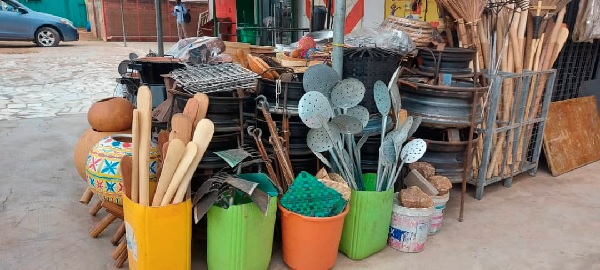
Technology can’t beat us; traders of traditional household
Enter a modern kitchen today and you will be blown away by the types of gadgets that have replaced traditional household items.
Some modern kitchens can easily pass as “tech hubs” as almost every appliance there uses technology of some sort.
Advertisement
Blenders, microwaves, kettles, cooking stoves (electric and gas), vacuum cleaners, washing machines, air fryers, rice cookers and dish washers are some of the gadgets you are likely to find in kitchens today.

Most Ghanaians are familiar with preparing banku this way
However, even in the most sophisticated Ghanaian kitchen, there are some household items which are still useful and irreplaceable.
Unlike the gadgets aforementioned, they may not be displayed in the open and may be ‘hidden’ and brought out when they are needed.
Asanka, tapoli, coal pot, banku ta, pestle and mortar and papa (hand woven fan) are some traditional household items which can be found in almost every Ghanaian kitchen.

This electronic response cooker cooks faster than the coal pot
Aunty Ama, a trader along the Gbawe-Mallam Road in Accra who has sold these items for over 15 years, told The Mirror that people still purchased those items despite technology.
She said she had stayed in that business for this long as a result of high patronage.
The items, she explained, were needed for different reasons and so although people patronised modern home appliances, those local items also had their market.
She explained that for instance, people who boiled herbs preferred to use the clay pots or metallic pots (dadesen) instead of a nonstick pan which was modern.

Some caterers use some traditional household items for buffet setups.
Picture credit: Food Bank GH
The metallic pots and coal pots, she stated, were also highly patronised by caterers who cooked in large quantities.
“There are many people who can’t prepare banku on a stove, and if you enjoy banku and can’t use a stove, you have to a buy coal pot, dadesen, banku ta, papa and banku dade. I am yet to see a version of these items supported by technology.”
Aunty Ama added that there was a growing trend among event organisers where they used some local household items as props for setups.
“These days I get many event organisers who want to have a unique African setup so they buy calabash, pots (clay and metal) and asanka as props for event setup. Others also serve their meals in asanka and drinks in calabash.
“Others buy them as event favours or gifts for their guests. With the exception of the asanka and clay pot which could easily be damaged if not handled well, most of these items last a lifetime and so they are good gift items,” she added.

Even in the most sophisticated Ghanaian kitchen, one of these items will be found
Another trader at Bubuashie, in Accra Mr Yaw Boateng, who sells mortars and pestles used for pounding fufu and palm nuts, said when the fufu machine was introduced some time back, he thought their business would be affected but that had not been the case.
He said most people still used the pestle and mortar, adding “people who use the fufu machine still need the mortar and pestle for the finishing touches. I also haven’t seen any machine used for palm nuts, maybe they are still working on it but currently there is none on the market”.
Mr Boateng said some people also ordered the miniature mortar and pestle for grinding herbs or for decoration.

Blenders work faster and saves time but cannot function without electricity
Both traders admitted that the items were made to last a long time so they had to sell other items in addition to their ware.
“If someone buys a mortar and pestle today, it would take years for the person to buy again so that cannot be a sole source of income,” Mr Boateng said.
Limitations
Although these household items are indispensable, one of their key limitation is time.
While it will take a blender less than a minute to blend a handful of tomatoes, the asanka and tapoli require more energy and time and if it is pepper or ginger which is ground, the possibility of experiencing a burning sensation on the fingers afterwards is not uncommon.
However, Aunty Ama was of the view that the blenders and other electronic appliances could also not function without light so having those items as a back-up was important.

Fufu machines are gaining popularity
“With these items, you don’t have to worry about ‘dumsor’ (power outages); you can enjoy your fufu, banku or pepper without worrying about electricity. Pepper ground in asanka even tastes and looks better than blended pepper,” she said jokingly.

The pestle and mortar are indispensable Picture: ESTHER ADJEI
The observation of this trend indicates that the traditional household items are likely to remain relevant in the Ghanaian society for a lot more years to come.




